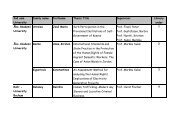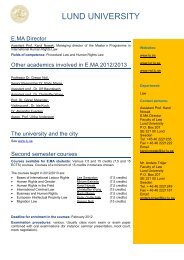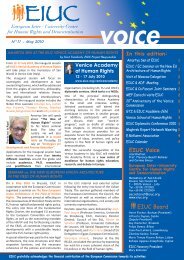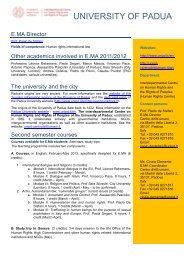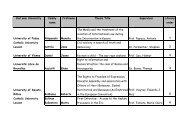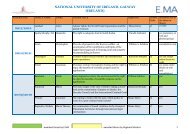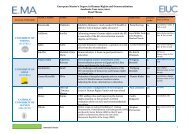study human rights mainstreaming in eu's external relations - EIUC
study human rights mainstreaming in eu's external relations - EIUC
study human rights mainstreaming in eu's external relations - EIUC
You also want an ePaper? Increase the reach of your titles
YUMPU automatically turns print PDFs into web optimized ePapers that Google loves.
DG EXPO Policy Department<br />
and lobby<strong>in</strong>g to dissuade sw<strong>in</strong>g voters from follow<strong>in</strong>g their spoiler-led regional blocs rather than<br />
their own stated <strong>human</strong> <strong>rights</strong> pr<strong>in</strong>ciples” 96 .<br />
Enhanc<strong>in</strong>g <strong>human</strong> <strong>rights</strong> <strong>ma<strong>in</strong>stream<strong>in</strong>g</strong> <strong>in</strong>to ESDP operations<br />
With regard to <strong>in</strong>corporat<strong>in</strong>g <strong>human</strong> <strong>rights</strong> <strong>in</strong>to the ESPD, it can be noted <strong>in</strong> general that<br />
important ga<strong>in</strong>s have been made <strong>in</strong> recent years while more still rema<strong>in</strong>s to be done. Key<br />
documents used <strong>in</strong> ESDP missions, such as the EU guidel<strong>in</strong>es on the protection of civilians,<br />
the EU tra<strong>in</strong><strong>in</strong>g concept, and standards of behaviour, now all <strong>in</strong>tegrate <strong>human</strong> <strong>rights</strong><br />
aspects, <strong>in</strong> particular gender issues and child protection. The <strong>human</strong> <strong>rights</strong> experts of the<br />
Council Secretariat are <strong>in</strong>creas<strong>in</strong>gly <strong>in</strong>volved <strong>in</strong> the plann<strong>in</strong>g, review and follow-up to<br />
operations. All eleven EU Special Representatives (for example <strong>in</strong> Bosnia-Herzegov<strong>in</strong>a,<br />
Kosovo, Great Lakes region, Middle East, Southern Caucasus) have the promotion of respect<br />
for <strong>human</strong> <strong>rights</strong> and the rule of law <strong>in</strong> their mandate. Accord<strong>in</strong>g to Amnesty International 97 ,<br />
“the centrality of <strong>human</strong> <strong>rights</strong> for conflict prevention and crisis management is clearly<br />
understood and acknowledged <strong>in</strong> the context of the ESDP”, although much rema<strong>in</strong>s to be done<br />
to br<strong>in</strong>g it <strong>in</strong>to practice. Efforts are for example still needed to reach greater consistency<br />
between peace-build<strong>in</strong>g and conflict prevention. Accord<strong>in</strong>g to the Human Rights and<br />
Democracy Network 98 , <strong>human</strong> <strong>rights</strong> advisors should be more numerous <strong>in</strong> EU missions and<br />
more possibilities for the fund<strong>in</strong>g of <strong>human</strong> <strong>rights</strong> projects <strong>in</strong> the framework of peace<br />
build<strong>in</strong>g and conflict prevention should be found.<br />
Electoral missions<br />
In its 2000 communication, the Commission made a number of recommendations to<br />
improve election observation and assistance. This <strong>in</strong>cluded that all EOM should be<br />
conducted and funded under the Community competency and under agreements with<br />
third countries and <strong>human</strong> <strong>rights</strong> regulations. The Commission also advocated better annual<br />
plann<strong>in</strong>g, the possibility of case-by-case decisions on the launch<strong>in</strong>g of an EOM, the creation<br />
of an EU electoral unit, and a special role to be attributed to the European Parliament and<br />
MEPs.<br />
Re<strong>in</strong>forc<strong>in</strong>g the <strong>human</strong> <strong>rights</strong>-based approach to development cooperation<br />
While the Commission’s overall commitment to implement a <strong>human</strong> <strong>rights</strong> framework <strong>in</strong> the<br />
area of development cooperation is clear – and the Council gave its open consent to the<br />
adoption to a <strong>human</strong> <strong>rights</strong>-based approach to development and cooperation <strong>in</strong> its 2001<br />
conclusions - the extent to which this commitment has been translated <strong>in</strong>to practice<br />
rema<strong>in</strong>s dubious. The lack of a <strong>ma<strong>in</strong>stream<strong>in</strong>g</strong> of <strong>human</strong> <strong>rights</strong> <strong>in</strong>to development policy<br />
seems to reflect the lack of emphasis put by EU policy documents and tools on economic,<br />
social and cultural <strong>rights</strong>. A factor contribut<strong>in</strong>g to the resistance to adopt<strong>in</strong>g explicit <strong>human</strong><br />
<strong>rights</strong>-based approaches to development cooperation may be concerns about charges of<br />
conditionality. As a result, there is hardly any systematic reference to and use of <strong>human</strong><br />
96 Human Rights Watch (2007) “World Report 2007”.<br />
97 Amnesty International (2007) “Annual Report 2006-07: Human Rights and the EU”. .<br />
98 Human Rights & Democracy Network (2009) “Manifesto on Human Rights for the new European<br />
Parliament, 2009”.<br />
46



